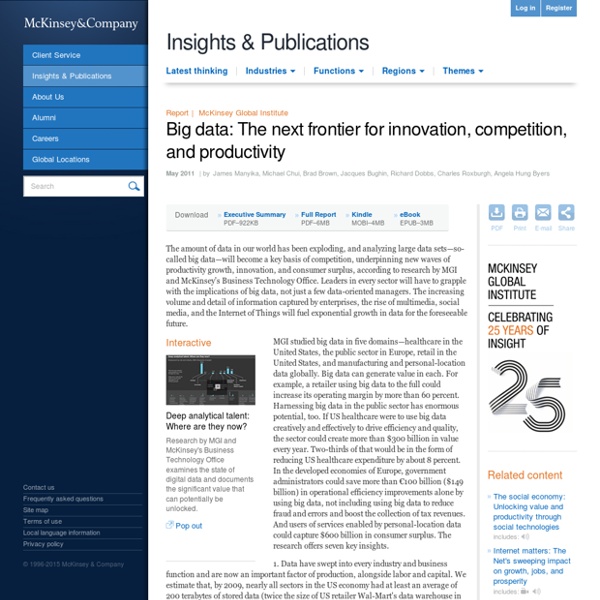home: Strata New York 2011 - O'Reilly Conferences, September 22 - 23, 2011, New York, NY
Find out more about Strata 2012, happening February 28 - March 1 in Santa Clara, California. If you weren't able to attend, you can still get a taste of Strata New York with the Strata Conference New York 2011: Complete Video Compilation . At our first Strata Conference in February, forward-thinking developers, analysts, researchers, and entrepreneurs realized that they were converging on a new profession—data scientist. Since then, demand has skyrocketed for data scientists who are proficient in the fast-moving constellation of technologies for gleaning insight and utility from big data. "A significant constraint on realizing value from big data will be a shortage of talent, particularly of people with deep expertise in statistic and machine learning, and the manager and analysts who know how to operate companies by using insights from big data." —McKinsey Global Institute report, "Big Data: The next frontier for innovation, competition, and productivity," May, 2011
CourseSmart announces analytics program to measure student engagement
It has never been too hard to spot the student in class who didn’t do the assigned reading -- she’s usually the one in the back, not raising her hand, and avoiding eye contact in hopes of not being called on. But a new program could make identifying unprepared students even easier, and, the creators hope, improve outcomes and retention. CourseSmart, the digital textbook provider that is partnered with five major publishers, announced the launch of CourseSmart Analytics on Wednesday. The program, which is currently being piloted at three colleges, tracks students’ engagement with their e-textbooks and provides and allows professors and colleges to evaluate the usefulness of learning materials and to track student work. The program looks at metrics of student usage, including page views, time spent in a textbook, notes taken, highlights made, bookmarks used, and whether or not the student even opened the book. Professors can also evaluate how engaged the class is as a whole.
Myriad opportunities in Data Science
March 7, 2013: Data scientists Explaining a host of opportunities in data science, Gaurav Vohra busts some related myths.Data Science has emerged as one of the most exciting fields in the recent times.
The social economy: Unlocking value and productivity through social technologies
In a few short years, social technologies have given social interactions the speed and scale of the Internet. Whether discussing consumer products or organizing political movements, people around the world constantly use social-media platforms to seek and share information. Companies use them to reach consumers in new ways too; by tapping into these conversations, organizations can generate richer insights and create precisely targeted messages and offers. While 72 percent of companies use social technologies in some way, very few are anywhere near to achieving the full potential benefit.
Research, Articles, Media
Big Data Research and Analysis from The Wikibon Project The best of Wikibon's Big Data research and analysis. Follow Wikibon Big Data Analyst Jeff Kelly on Twitter and LinkedIn. For a list of Wikibon clients, click here.
Big Data, Big Noise, Big Trouble?
I have been hearing the term “big data” a lot lately (should it be capitalized?) and may even have talked about it inadvertently in my latest blog (“What Lurks in your Unstructured Data?”). But, I am not sure what it is. Can one byte be bigger than another?
Knowledge Media Institute
Alumni Member Professor of Learning Informatics My work is inspired by the vision and >40 years’ work of pioneer Doug Engelbart: to develop technologies which “augment human intellect”, our “collective capability for coping with complex, urgent problems.” My current work revolves around these separate but also intersecting fields: * Collective Intelligence infrastructure (technologies and ways of working that pool what is known) for contested knowledge (these days most claims are contestable, and in any serious dilemmas, there is disagreement about the way forward). * Learning Analytics (how do you know if someone is learning from the digital traces they leave behind?)
MSc Data Science and Management
Programmes Imperial College Business School’s postgraduate programmes offer the opportunity to study at a global top-ten ranked university in the heart of London Our Programmes MBA Programmes Imperial College Business School's MBA is highly practical and relevant.
Accelerate!
Perhaps the greatest challenge business leaders face today is how to stay competitive amid constant turbulence and disruption. Any company that has made it past the start-up stage is optimized for efficiency rather than for strategic agility—the ability to capitalize on opportunities and dodge threats with speed and assurance. I could give you 100 examples of companies that, like Borders and RIM, recognized the need for a big strategic move but couldn’t pull themselves together to make it and ended up sitting by as nimbler competitors ate their lunch. The examples always play out the same way: An organization that’s facing a real threat or eyeing a new opportunity tries—and fails—to cram through some sort of major transformation using a change process that worked in the past. But the old ways of setting and implementing strategy are failing us. We can’t keep up with the pace of change, let alone get ahead of it.
Grad schools add big-data degrees
News Analysis October 8, 2012 06:00 AM ET Computerworld - Colleges and universities are moving swiftly to create advanced degree programs to help meet what's expected to be rapidly rising demand among employers for specialists who can manage and analyze big data. The schools are likely aware of a McKinsey report warning of a mega-shortage of analytical experts that could leave as many as 190,000 positions unfilled by 2018. They're also responding to appeals from big employers like IBM and SAS Institute that have been lobbying college administrators to set up such programs.



